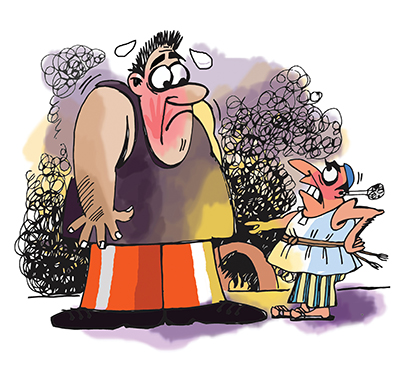The kicker
Berjis Desai
His great-grandfather was one of the first migrants to Bombay from Bulsar (as Parsis prefer to call Valsad in south Gujarat) and worked as a skilled carpenter in the shipbuilding firm of the Wadias. Our hero had a modest but comfortable childhood, with little interest in arithmetic, and even lesser interest in learning English. Out of his small inheritance, he started a business to manufacture and sell potato wafers (as chips were then called). He called them paw-tè-toe in his Gujarati accent.
Thick, tasty, golden, salty, wholesome, fatty wafers made from the finest potatoes and fried in fresh oil extracted from groundnuts (the whole cauldron of oil emptied into the drain after a certain quantity had been fried). Although he did not know what carcinogenic meant, he hated the wafers being fried in re-used, black oil. His was a single product company with no pretensions. Packed in white butter paper bags, straight from the huge kadhai (frying pan), the wafers sold like hot cakes. You opened the paper bag and the aroma was divine. If you broke his wafer into two and brushed it on your hand, a scratch would appear; yet they were saliva oozingly delicious. He was very proud of his wafers. If a friend suggested that he could multiply his profits by using slightly ‘B’ class potatoes and not discarding oil so quickly, he was furious. His wife, whom he adored, managed the accounts.
He was happily expecting her to deliver their first child, after a decade of an idyllic marriage. Life had never been so blissful. After a copy book pregnancy under the care of the then leading Parsi gynecologist, her labor commenced in The B. D. Petit Parsee General Hospital. The Sunday evening seemed very long, as he paced in the Hospital corridors. The eminent doctor, whom he phoned to irritation, advised him to be patient. The spasms intensified with unbearable pain. When the doctor finally arrived, he found her slipping into a coma. By Caesarean, a girl was delivered but there was no mother to breast-feed the newborn. In a blind rage, he wrestled the old doctor onto the floor and tried to throttle him, until security intervened. The episode became the talk of the town. For no fault of the doctor, his vast practice dwindled.

Illustration by Farzana Cooper
Inconsolable and devastated, he desperately sought a purpose in life. Manchersha Madhiwala, the missionary healer of slipped discs and broken bones, decided to impart the healing art to the wafer man. Serve selflessly, in humility, without charging a cent to any human, was Madhiwala’s diktat. He followed this diktat up to his dying day. Near the sales outlet of wafers, he started a free healing center dedicated to his lost love.
Two men held the patient on the ground. He took a deep breath, mumbled a prayer, focused on the affected spot, and kicked ferociously. A momentary howl of pain, and the prostate body magically rose, thanked him tearfully, and went away smiling. No ribs were cracked or kidneys damaged and no one died. Perhaps, a few did not heal, but their condition never worsened. Some said that he was not as effective as Madhiwala’s other Parsi disciples. He believed that he was the best.
Between frying wafers and giving healing kicks, he had little time to bring up his daughter. Subconsciously, he blamed her arrival for his tragedy. Feeling guilty, he began to spoil her silly. Seven years later, his friends compelled him to marry a fine Parsi lady – shy, from a poor family but attractive and 22 years his junior, tall and towering above his short, compact frame. She gave him much solace and joy, proving to be an ideal stepmother. However, the daughter continued to regard her as an intruder. They travelled the world together, dined at decent restaurants and constructed a holiday home overlooking the Tithal beach, in his hometown Bulsar.
Half a century ago, Cuffe Parade was still uncluttered and pristine with its row of semi Gothic bungalows having a frontal view of the Arabian Sea. He rented the spacious first floor of one such bungalow. The flashes of his famous anger though never left him. Woe betide a person criticizing his wafers or his healing activities or comparing him with his fellow kickers or even remotely suggesting that the death of his first wife was not attributable to any medical negligence.
Two famous wrestler brothers (who were once top slotted at the Vallabhbhai Patel Stadium bouts) opened a tandoor eatery in the ground floor of his bungalow. The restaurateurs cared a damn for regulations or hygiene or safety. The tandoor was located just under the toilet in his master bedroom. The toilet heated up to unbearable limits, despite his daily complaints to the wrestler brothers. Then, one night, when he was sitting on the throne, the tandoor rumbled on the ground floor and uprooted his toilet with a great gush of filth. He ran down in his sleeping suit, dripping wet with the organic matter, and before the stunned diners in the restaurant, slapped one of the wrestler brothers, who was sitting at the counter. The waiters winced at the prospect of what the insulted wrestler would do next to this Parsi man. The wrestler menacingly came forward and stood against the kicker’s five feet two inches. The kicker stood unperturbed, with that rather stupid but angry expression. The wrestler smiled and said, "Bawaji, you have a right to hit me! You may not remember, but you had cured my late mother’s slipped disc by kicking her.”
After a few weeks, the tandoor was shifted, and the restaurant started serving, along with cheap alcohol, a complimentary plate of the kicker’s golden wafers, to its delighted customers.
Berjis M. Desai is a lawyer in private practice and a part-time writer. He considers himself an unsuccessful community activist.
